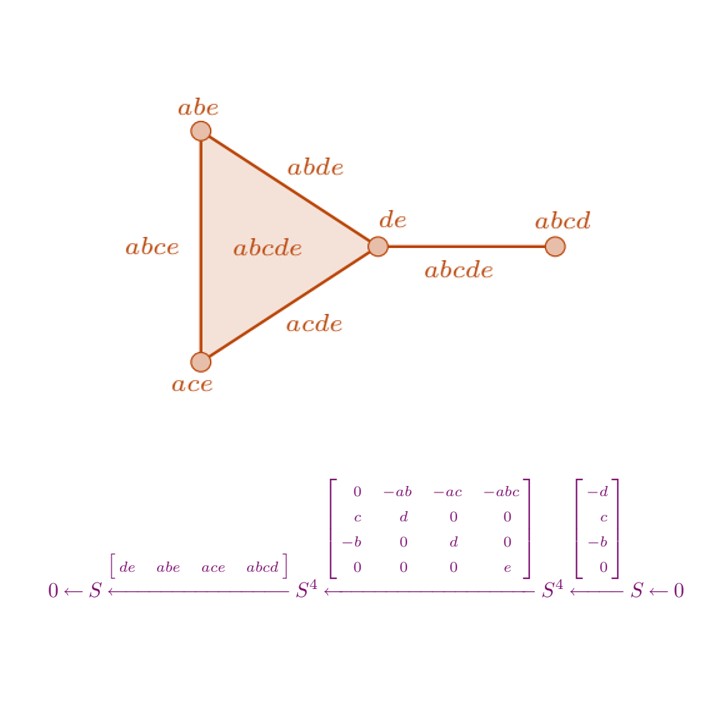Summer Graduate School
| Parent Program: | -- |
|---|---|
| Location: | Fields Institute, Toronto, Canada |
Show List of Speakers
- Christine Berkesch (University of Minnesota)
- Sergio Da Silva (Virginia State University)
- Sara Faridi (Dalhousie University)
- Federico Galetto (Cleveland State University)
- Elena Guardo (Università di Catania)
- Daniel Hernández (University of Kansas)
- Jack Jeffries (University of Nebraska)
- Patricia Klein (Texas A & M University)
- Claudia Miller (Syracuse University)
- Adam Van Tuyl (McMaster University)

The 2025 SMS will allow graduate students to learn about a number of recent trends and advances in the field of commutative algebra. The aim of the SMS is to provide an “on-ramp” for graduate students interested in algebra, combinatorics, and/or algebraic combinatorics to learn more about commutative algebra’s interaction with these fields. The introductory courses will introduce fundamental skills in commutative algebra, the more intermediate courses will expose students to cutting-edge research in the field. The school will focus on four topics within commutative algebra: Combinatorial Methods, Homological Methods, Computational Methods, and Characteristic p Methods. The SMS will provide both a series of introductory lectures and intermediate/advanced lectures from leaders in one of the four areas. The lectures will include a series of problem sessions that will allow participants to develop and hone their skills in these areas, which will be especially helpful for new people to the field. Participants will be encouraged to work collaboratively, both to enhance their own mathematical networks as well as to promote future collaborations beyond the school.
School Structure
The first week of the SMS will consist of four introductory courses which introduce the particiapnts to four main themes of current research in commutative algebra. These courses will be followed up in the second week by four intermediate to advance level courses that build upon the introductory courses. Each course will have a problem session. The organizers and other instructors will work with students during the problem sessions to create a collaborative experience. The second week will also include lightning talks to give the students an opportunity to present their work and also a professional development panel. Wednesday afternoons will be free for informal discussions, collaboration, or restorative down time or socializing.
The full schedule can be found HERE.
Prerequisites
The SMS is primarily aimed at graduate students, especially those who are in the first few years of their program and have an interest in algebra, algebraic combinatorics, or algebraic geometry. We will expect students to have completed at least the first year of their graduate program, including the material covered in a typical first-year graduate algebra sequence that many schools use as preparation for a qualifying/prelim exam. To accommodate differing levels of background, students will self select into either a beginning group or an advanced group for each of the problem session components of the courses. Advanced students will also be encouraged to help the beginning students. The organizers and speakers will also be on hand to help provide any additional background participants may require.
DF = Dummit, Foote - Abstract Algebra
A = Artin - Algebra
CLO = Cox, Little, O'Shea - Ideals, Varieties, and Algorithms
Required algebra background:
- ring theory (as in DF chapters 7, 8, 9; or A chapters 10, 11)
- module theory/linear algebra (as in DF chapters 10, 11; or A chapters 3, 4, 12)
- field theory (as in DF chapter 13; or A chapter 13)
Optional:
-
Gröbner theory (as in CLO chapters 1, 2)
Having been introduced to commutative algebra (e.g. a first course based on Atiyah, Macdonald - Introduction to Commutative Algebra, Eisenbud - Commutative Algebra with a view toward Algebraic Geometry, or similar) would be an acceptable alternative to the general algebra background above.
Complementary, but not strictly necessary, background may include some algebraic geometry (e.g. a first course based on Hartshorne - Algebraic Geometry, Hassett - Introduction to Algebraic Geometry, or similar) or combinatorial commutative algebra (e.g. select material from Miller, Sturmfels - Combinatorial Commutative Algebra).
Application Procedure
SLMath is only able to support a limited number of students to attend this school. Therefore, it is likely that only one student per institution will be funded by SLMath.
For eligibility and how to apply, see the Summer Graduate Schools homepage.
Venue
The summer school will take place at the Fields Institute in Toronto, Ontario.
commutative algebra
combinatorial algebra
homological algebra
computational algebra
positive characteristic
Gröbner geometry
multigraded modules
projective points
F-singularity theory
|
Jun 02, 2025 Monday |
|
||||||||||||||||||||||||
|---|---|---|---|---|---|---|---|---|---|---|---|---|---|---|---|---|---|---|---|---|---|---|---|---|---|
|
Jun 03, 2025 Tuesday |
|
||||||||||||||||||||||||
|
Jun 04, 2025 Wednesday |
|
||||||||||||||||||||||||
|
Jun 05, 2025 Thursday |
|
||||||||||||||||||||||||
|
Jun 06, 2025 Friday |
|
||||||||||||||||||||||||
|
Jun 09, 2025 Monday |
|
||||||||||||||||||||||||
|
Jun 10, 2025 Tuesday |
|
||||||||||||||||||||||||
|
Jun 11, 2025 Wednesday |
|
||||||||||||||||||||||||
|
Jun 12, 2025 Thursday |
|
||||||||||||||||||||||||
|
Jun 13, 2025 Friday |
|